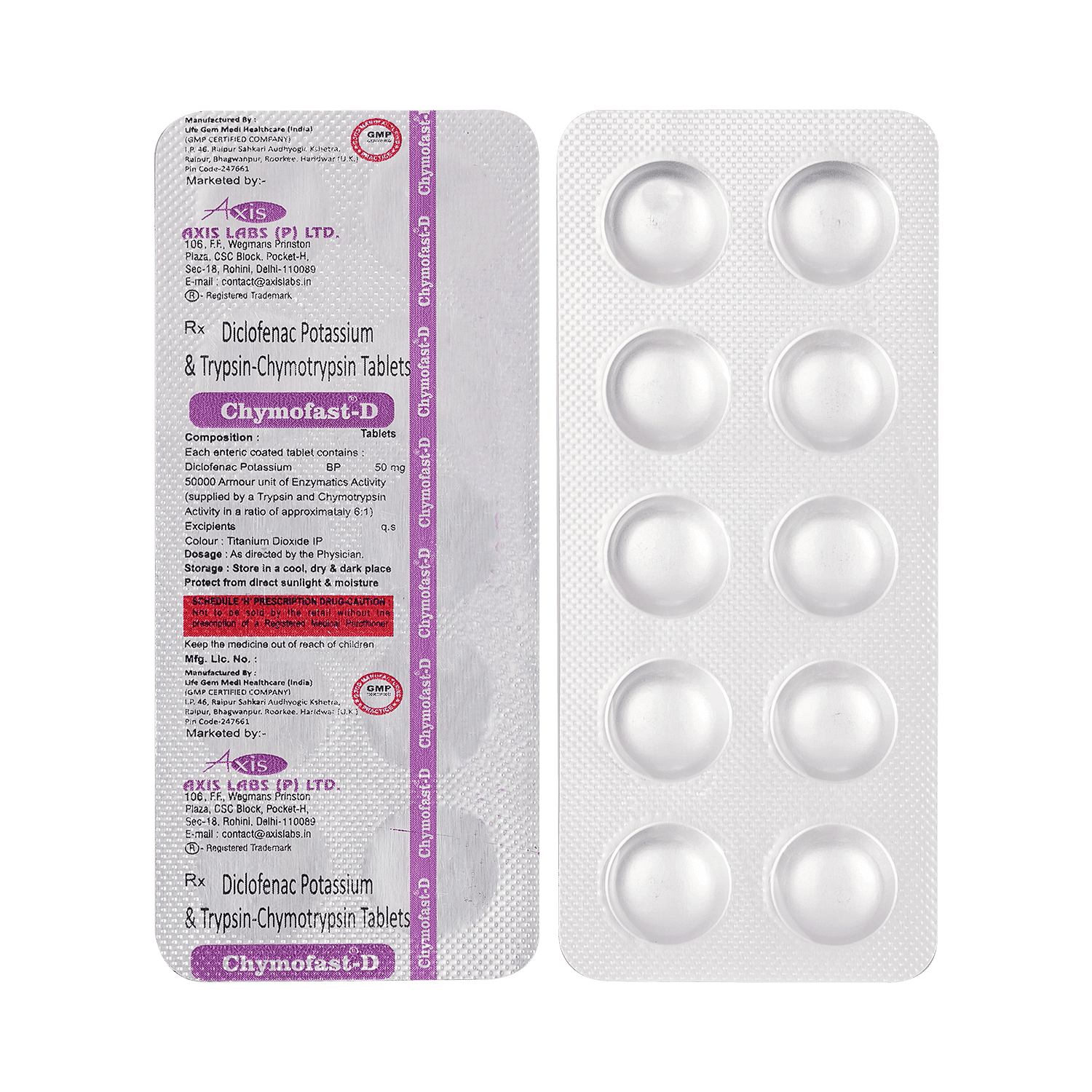
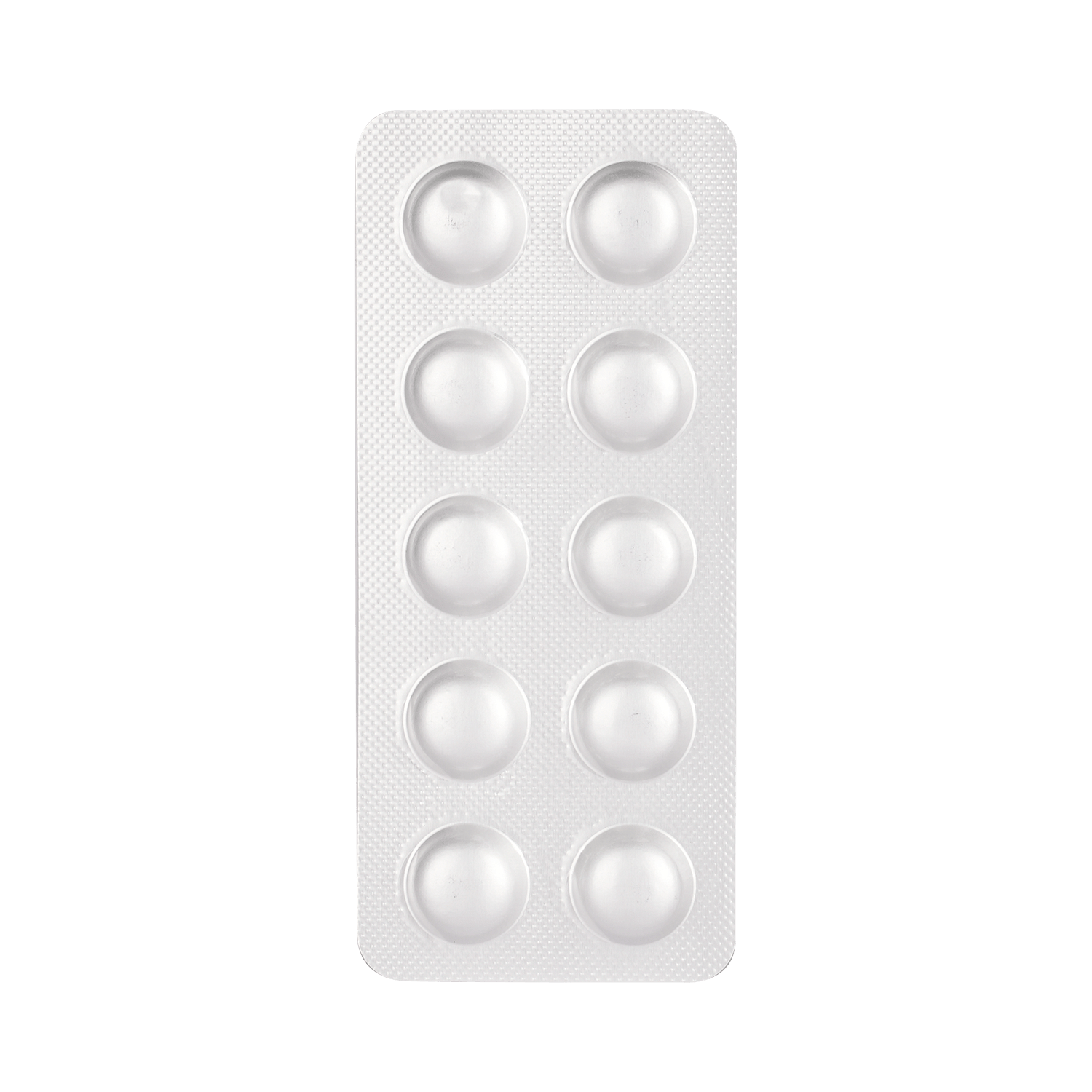
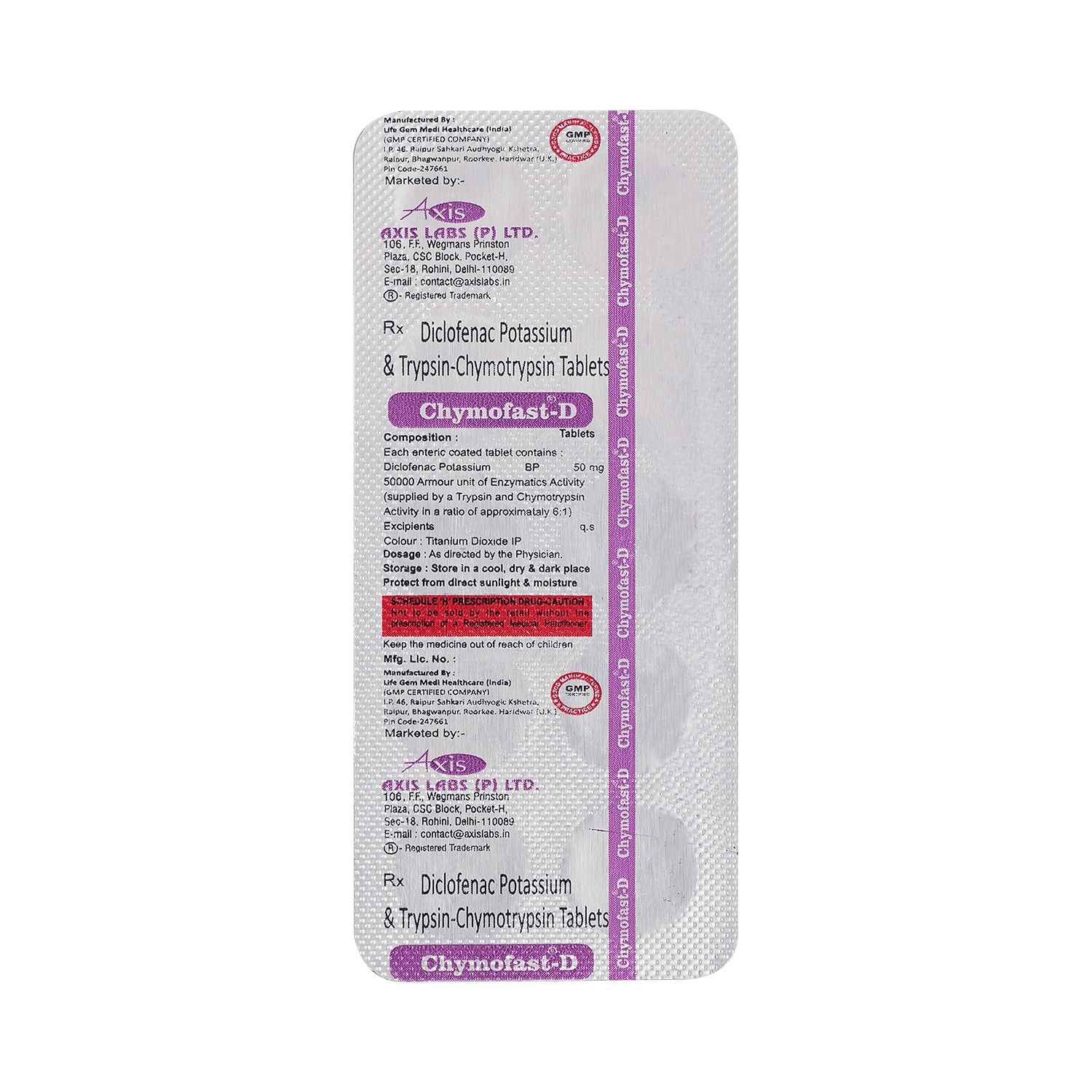
Chymofast-D Tablet
Manufacturer
Axis Labs Pvt Ltd
Salt Composition
Diclofenac (50mg) + Trypsin Chymotrypsin (000IU)
Key Information
Short Description
Chymofast-D Tablet is a combination of two medicines used to relieve pain and inflammation in conditions like rheumatoid arthritis, ankylosing spondylitis, and osteoarthritis.
Dosage Form
Tablet
Introduction
Chymofast-D Tablet is to be taken with food. This will prevent you from getting an upset stomach. The dose will depend on what you are taking it for and how well it helps your symptoms. You should take it as advised by your doctor. Do not take more or use it for longer duration than recommended by the doctor.
Directions for Use
Take this medicine in the dose and duration as advised by your doctor. Swallow it as a whole. Do not chew, crush or break it. Chymofast-D Tablet is to be taken with food.
How it works
Chymofast-D Tablet is a combination of two medicines: Diclofenac and Trypsin Chymotrypsin which relieve pain and inflammation. Diclofenac is a non-steroidal anti-inflammatory drug (NSAID) which works by blocking the release of certain chemical messengers in the brain that are responsible for pain, fever and inflammation (redness and swelling). Trypsin Chymotrypsin is a combination of enzymes which break down proteins into smaller fragments, thereby making them available for absorption into the blood. Once absorbed, they increase blood supply in the affected area and reduce swelling.
Quick Tips
Take it with food to help prevent an upset stomach. Take it as per the dose and duration prescribed by your doctor. Long term use may lead to serious side effects. It may cause dizziness, drowsiness or visual disturbances. Use caution while driving or doing anything that requires concentration. Avoid consuming alcohol while taking this medicine as it can cause excessive drowsiness and increase your risk of stomach problems. Inform your doctor if you have a history of heart disease, stroke, liver or kidney disease or problems with your blood clotting mechanism.
Related Medicines
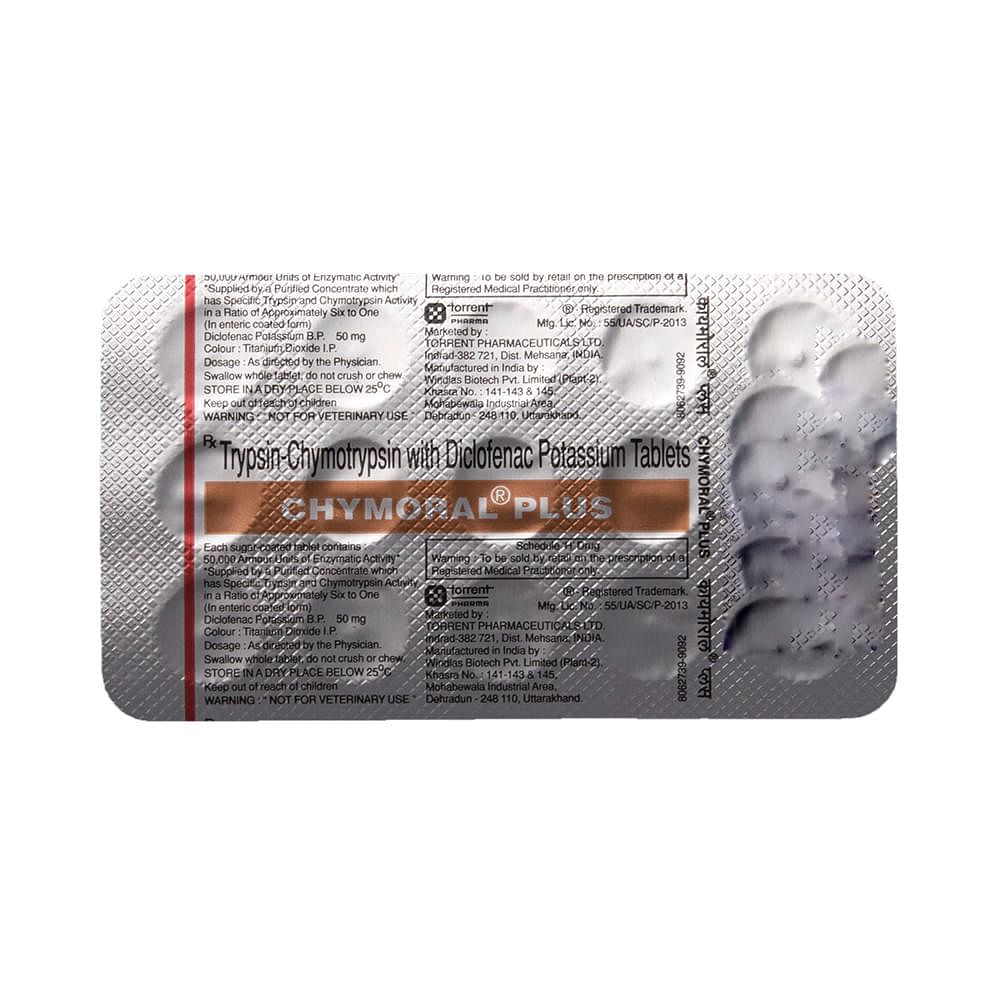
Chymoral Plus Tablet

Finipsin 50mg Tablet

Kymozen-D Tablet

Chymovos D 50mg Tablet

Chymobel Plus Tablet

Tripcam D 50mg/50000IU Tablet

TRYC-D Tablet

Trydic D 50mg/50000IU Tablet

Trypcet-D Tablet
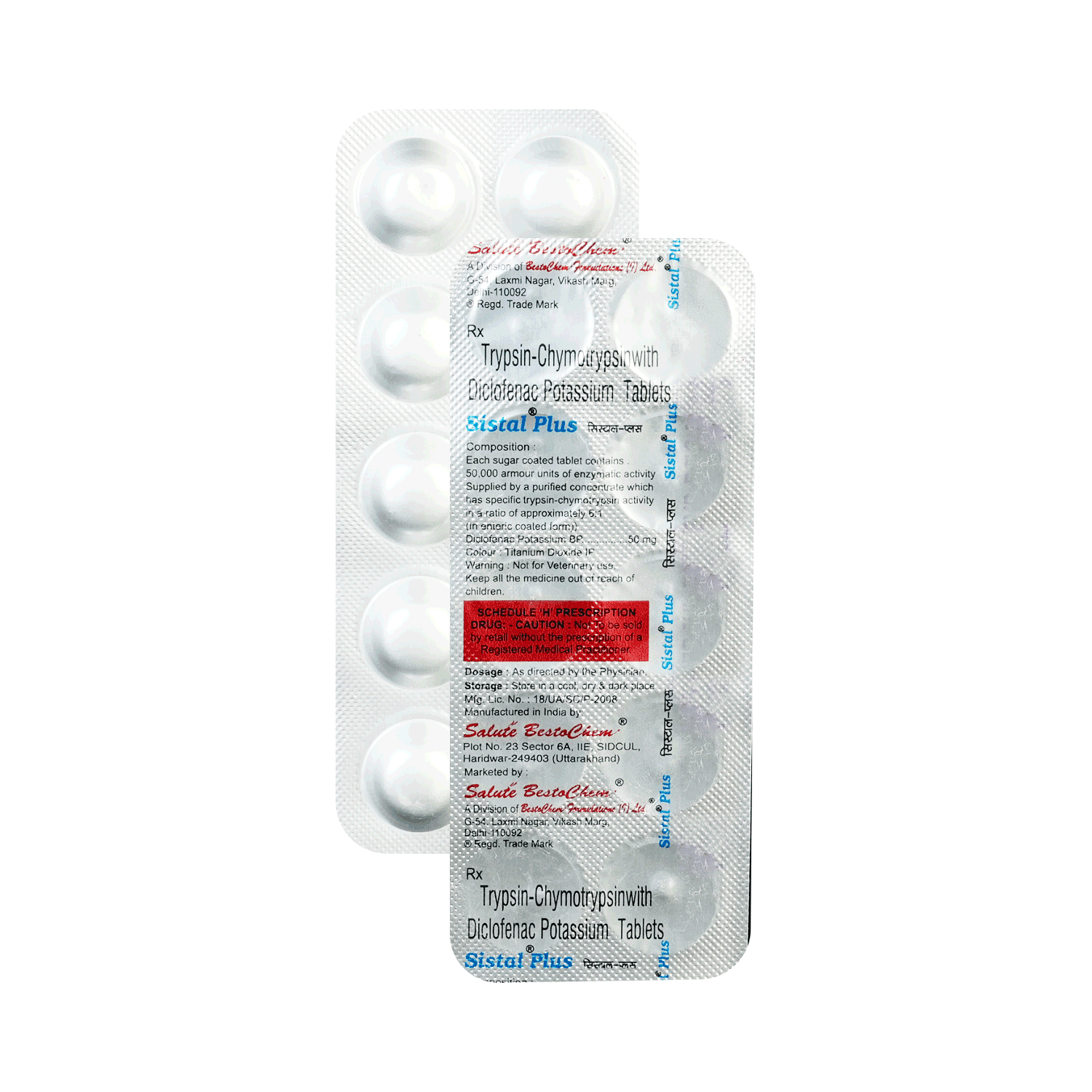
Sistal Plus Tablet
Frequently asked questions
Will taking a higher than the recommended dosage of Chymofast-D Tablet be more effective?
No, taking a higher than the recommended dose may not lead to increased effectiveness, and it may increase the likelihood of experiencing serious side effects and toxicity. If you experience an escalation in your symptoms that are not alleviated by the prescribed dose, consult your doctor for re-evaluation.
Are there any specific contraindications associated with the use of Chymofast-D Tablet?
Chymofast-D Tablet is potentially harmful in individuals with known allergies to any of its components or excipients. It is also advised to avoid this medication in patients with a history of active, recurrent stomach ulcers or bleeding. Individuals with a history of heart failure, high blood pressure, and liver or kidney disease should also consult with their doctor before using Chymofast-D Tablet.
Does Chymofast-D Tablet expire?
Yes, Chymofast-D Tablet has an expiration date. Check the expiry date on the package of this medication before use. Do not use Chymofast-D Tablet after the expiration date.
What is Chymofast-D Tablet?
Chymofast-D Tablet is a combination of three medicines: Diclofenac, Trypsin, and Chymotrypsin. This medicine helps to reduce pain and swelling by lowering the levels of chemical substances in the body that cause pain and swelling.
Can I get addicted to Chymofast-D Tablet?
No, there are no reports indicating addiction with Chymofast-D Tablet.
Can I stop taking Chymofast-D Tablet when my pain is relieved?
Chymofast-D Tablet is typically used for short-term and can be discontinued when your pain is relieved. However, it's crucial to continue as advised by your doctor if you receive instructions to do so.
Can the use of Chymofast-D Tablet cause dizziness?
Yes, some patients may experience dizziness (feeling faint, weak, unsteady or lightheaded) after using Chymofast-D Tablet. If you feel dizzy or lightheaded, stop what you are doing and sit or lie down for a while until you feel better. Do not drive or operate machinery.
Can the use of Chymofast-D Tablet cause damage to kidneys?
Long-term use of Chymofast-D Tablet can potentially damage the kidneys. Normal kidneys produce prostaglandins that protect them from damage. However, using painkillers lowers the levels of prostaglandin in the body, leading to kidney damage over time. Patients with underlying kidney disease should avoid using painkillers.
How long will Chymofast-D Tablet take to act?
It may take approximately one hour for the initial benefits of pain relief after taking Chymofast-D Tablet.
What if I forget to take Chymofast-D Tablet?
If you miss a scheduled dose of Chymofast-D Tablet, do not take double the dose. Instead, skip the missed dose and continue with your regular medication schedule. If unsure about how to manage this situation, consult your doctor for guidance.


